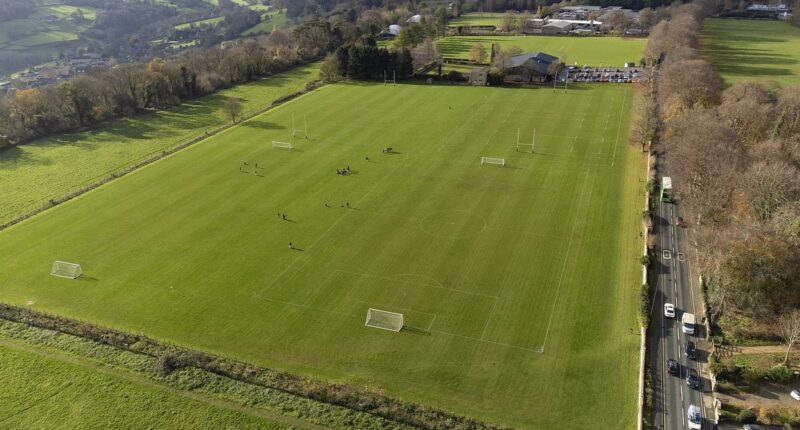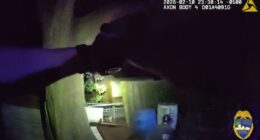Share this @internewscast.com
Perched with breathtaking views of the Cotswolds and the iconic White Horse of Westbury, Claverton Down is a vital component of Bath’s World Heritage Site recognition.
However, these scenic vistas and the tranquil environment that supports some of the world’s rarest wildlife could soon be at risk. Plans are in motion to strip away fields from the Green Belt to pave the way for hundreds of student residences.
The University of Bath has stirred controversy by proposing the construction of up to 296 student accommodations on the grounds of Sulis Club, a 30-acre area currently serving as sports fields for university athletes and local schoolchildren.
In another move, this prestigious institution, recently honored as Sports University of the Year, has proposed building accommodations for an additional 962 students on its Claverton Down campus.
Local residents argue that the historic Roman city is increasingly dominated by student housing. Meanwhile, the neighboring villages of Claverton Down, such as Combe Down and Odd Down, have experienced significant new developments in recent years.
The latest proposals submitted to Bath and North East Somerset Council have sparked anger among locals. They claim that if approved, the development will obliterate their cherished views and severely impact the area’s wildlife.
It has also sparked a backlash from the university’s talented athletes as the original plan to transform the empty sports club into an indoor climbing centre – and keep the surrounding fields – was abandoned due to the ‘challenging financial environment’.
Battle lines are being hastily drawn up by locals who have formed an action group to fight the ‘audacious’ alternative which could see nearly 300 student dwellings built instead.

Bath University has submitted plans to turn Sulis Club (pictured), a sprawling spread of sports pitches used by its students as well as children from nearby schools, into accommodation for around 250 undergraduates. It is Green Belt land


Leading the charge on behalf of the area’s residents is Sanne Terry (left). Kevin Gibbs (right) said the ‘development will destroy the lives of everybody living here’

A panoramic view of the city of Bath, taken from the Claverton Down area
Leading the charge on behalf of the area’s residents is Sanne Terry, 50, herself a senior university figure at neighbouring Bristol University.
She said: ‘These sports pitches are quite rightly designated as part of Bath’s UNESCO world heritage site because of the area’s unique views, nestled within an area of outstanding natural beauty.
‘From the sports fields, you can see the southern Cotswolds and the White Horse at Westbury.
‘The university is not recognising its responsibility to the community it has nested itself within.
‘My guess is that finances are the driver of this decision, but do they really want to destroy this beautiful part of the city and cause huge upset and distress to a whole community for what will amount to maybe a couple of million pounds? Is it really worth it?
‘The views here and the peace we are lucky enough to enjoy in this part of Bath is what helps to attract 6 million tourists to the city every year. The Bath Skyline tour includes this area on its route for good reason.
‘The university has already had planning permission approved for more than 900 new units on its campus quite recently so the application for another 250 homes for students here seems gratuitous.
‘In my opinion any new accommodation should remain within the campus boundary.
‘This proposed scheme seems counter-productive to what a university should be offering.
‘Also, we are talking about a university made famous for its sport. Bath was awarded sports university of the year. But if these sports pitches are taken away, where will students be able to play their sports?
‘Several threatened species of bats, including lesser and greater horseshoe bats and Bechstein’s bats are found in the area because of the dark skies and natural valley habitat in which they thrive, all the way down to the River Avon. There are 17 endangered species of bats in this area in total.

Residents feel the historic Roman city has been taken over by student housing. Pictured: Pulteney Bridge in the city centre

Plans were initially in place to transform an empty sports club (pictured in middle with car park) on the land into an indoor climbing centre, but they were shelved

Residents love using the Bath Skyline walk at Claverton Down
‘They will all be lost because the building work will be so disruptive to the local wildlife and then, once the buildings are complete, we will have students who, as we know, like to stay up late at night, which of course creates light pollution and noise.
‘That is the worst thing for bats, never mind the rest of us.
‘Student housing needs to be on campus. Do not put their accommodation in a precious and sensitive area like this. I am afraid this time the university has quite simply got it wrong.’
Another furious local, retired water management expert Kevin Gibbs, 65, said: ‘I have lived here for the past 23 years because it is such a beautiful part of the world.
‘We love being so close to nature, yet within walking distance of a city with world class facilities. The semi-rural nature of this part of Bath is unique.
‘This development will destroy the lives of everybody living here – and the wildlife.
‘The traffic running through this area is already at high volumes, especially during commuter time.
‘If this audacious development goes ahead, we’ll have horrendous traffic congestion, as well as the unbearable noise of construction.
‘And then if the development is successful, all the green space will have gone. It will just be covered in concrete and the light pollution will make us feel like we’re living in the centre of the city.

The American Museum in the Claverton Down area of Bath
‘These green fields have to be protected, for the sake of the natural habitat, the wildlife, the sanity of local residents and for all the hundreds of people who play sport here.
‘The roads are not capable of taking more traffic and I’ve seen nothing to suggest services such as GPs, schools and dental surgeries are going to be built as part of the development.’
Vishaka Robinson, a local campaigner from Bath, said: ‘The local community is flabbergasted as to why University of Bath would even contemplate taking away young people’s access to sports facilities and also seek to build on protected Green Belt land.
‘Up until six months ago they were going to turn the old building which sits on the Sulis land into a community climbing wall – this had massive support. So everyone is feeling pretty blindsided by the University’s actions.
‘The management at University of Bath are acting like a greedy land developers not like a university (which enjoys the perks and also the duties of being a charity).
‘In 2023 to 2024 financial year University of Bath reported a surplus £9.8 million: So they should be investing in and maintaining their sports facilities. Instead they are seeking to massively inflate the value of Green Belt land they own by pursuing a plan to build over 250 homes on it.’
Gemma Killick, a planning consultant and local parent, warned the loss of the sports pitches would be a ‘backwards move for our community’.
Lisa Stares, chair of Friends of Ralph Allen School, told how the fields are used frequently by University of Bath students and the entire community.
She explained: ‘Ralph Allen secondary school for example (which sits beside the Sulis club) pays the University of Bath to use these fields for PE lessons and has done so for many years. So for the university (which prides itself as being a champion for sports) to attempt to turn the entire site into housing is pretty shocking.’
A retired businessman whose home looks out directly across the sports pitches to the famous White Horse at Westbury said he was ‘appalled’ at the Bath university proposals.
The retired businessman, who asked not to be named, said: ‘Why can’t the university simply leave things as they are?
‘If these plans are approved, that will be the end for the rare species that have made this part of England their home. I am particularly concerned about the rare bat species. My woodland, as well as much of the woodland around me, is used for monitoring and protecting these bats and I will be devastated to see them disappear.
‘I’ve lived here for more than 30 years and there is no better place in the world. We have these wonderful dark skies at night and even though we live so close to the centre of a busy city, it is wonderfully peaceful. I’ve nothing against students, but it will completely change the feel of the area. The noise and light will destroy this part of the world.’
The plans are also a bitter blow to members of a climbing club that had been working with the university to create a community climbing wall in a building used as changing rooms by sports teams on match day and during training sessions.
Ascent Climbing Club official Jon Phelps said: ‘On behalf of a broad coalition of stakeholders, including residents, climbing professionals, sporting bodies as well as university students and staff, we have expressed concerns regarding the university’s decision to withdraw support for the renovation and community use of the Sulis Club in favour of plans to remove its Green Belt designation in order to develop the site into purpose built student accommodation.
‘Through hundreds of public comments, messages, emails and conversations with stakeholders, we have built a strong understanding of the issues surrounding the Sulis project.
‘Climbing remains an internationally growing and Olympic sport. This is partly down to its accessibility and positive wellbeing outcomes. Bath remains one of the few cities in the UK without a public climbing centre, despite the huge number of existing regular climbers and other potential beneficiaries.
The social, financial and reputational benefits of a close relationship with a climbing centre for a university should not be underestimated, especially in a competitive international student market.
‘Furthermore, as the city continues to grow, demand for green space and sports pitches with adequate facilities, such as those on the Sulis Estate, will become even more sought after and financially sustainable.
‘This is identified in the Councils own local Playing Pitch Strategy (PPS), formulated in collaboration with Sport England, which repeatedly highlights the strategic importance and need to improve the sporting provision at the Sulis Club for continued community use and benefit.
Ascent Climbing sparked significant enthusiasm as it has progressed, with thousands of supportive comments across multiple platforms during its development.
‘The news of the University of Bath’s decision to withdraw from their commitment to rejuvenate the site…has generated a surge of impassioned public responses, expressing disappointment and frustration at the university’s and local council’s direction.
Consequently, hundreds of residents have voiced concerns about the loss of a valuable community asset and the erosion of inclusive recreational opportunities.
A spokesperson for University of Bath Students’ Union (The SU Bath) said: ‘SU Bath believes students and members of the local community deserve accessible sport.
‘In our submission to the local plan, we have opposed the removal of the Sulis Club from the Green Belt, as this poses significant risk to the local sports provision.
‘The Sulis Club encourages partnerships and fitness within the community, serving the University of Bath, Ralph Allen School, and the local community. The Sulis Club must be protected.’
A university spokesperson said: ‘The Sulis Club has been identified as a possible development option for the future in the local authority’s consultation on the Local Plan framework to 2042, which looks at how the whole district could grow and change over the next 15 to 20 years.
‘Should any potential development be considered in the future, the University is both mindful of and well experienced in taking into account environmental impact, sustainability, and the need to maintain appropriate sports provision across its sites and would conduct all necessary public and statutory consultations in the process.’

















